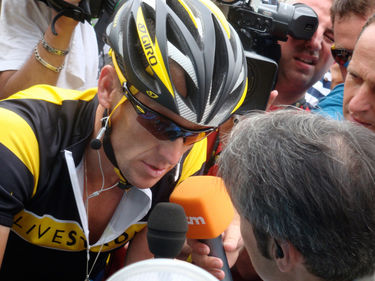In the sporting world, there are a handful of elite athletes who were able to rise head and shoulders above their competition. In the NFL, Jerry Rice not only still holds just about every major receiving record worth holding, but holds them all by such a huge margin that many will most likely never be broken. In the NHL, Wayne Gretsky was so dominant that the entire league, not just the teams for which he played, retired his number 99 jersey. The NBA’s Michael Jordan was a player who, every time he touched the ball, seemingly held the defense at the mercy of whatever it was that he wanted to do with it. These athletes had something special, something for which they have each been memorialized forever within their respective sports.
Lance Armstrong had it, too. At least, that’s what everyone thought. The 7-time Tour de France winner had fought allegations of doping for practically his entire career with none of the accusations sticking, passing every drug test that was ever administered to him. He stuck to his guns even when his titles were unjustly stripped from him by the International Cycling Union, so it was a huge surprise to all of his fans when, in 2013, he did an interview with Oprah Winfrey where he admitted to it all. Documentary filmmaker Alex Gibney (Freakonomics, Enron: The Smartest Guys in the Room) just happened to be making a movie about Armstrong’s quest for an eighth Tour de France win when the cyclist came clean. It was then when Gibney switched gears and followed the new story, changing the name of his film from The Road Back to The Armstrong Lie.

A very experienced documentarian, Alex Gibney is no stranger to sniffing out interesting sports stories. He was the mastermind behind the excellent ESPN documentary Catching Hell, about the Chicago Cubs fan who inadvertently cost his beloved team a trip to the World Series when he interfered with outfielder Moises Alou’s fielding of a foul ball. Gibney directed The Last Gladiators, a film about hockey “goons,” players whose major responsibility is to fight on the ice. He even served as executive producer on Venus and Serena, an eye-opening and insightful profile of the Williams sisters, the first family of tennis. The different between these films and The Armstrong Lie is that, in those films, Gibney found the story. In The Armstrong Lie, the story found him.
The Armstrong Lie begins with the notorious Oprah interview, in which she asks Armstrong the tough questions about his use of performance enhancing substances like cortisone, testosterone, and steroids, to which he answers “yes” to each one. Gibney then works backwards, documenting Armstrong’s rise in and dominance of the sport of cycling, covering his Tour wins from 1999 to 2005. The film documents his battle with testicular cancer that spread to his lungs and brain, his triumph over the disease, and his subsequent commitment to raising money for cancer research through his LiveStrong campaign. The film also covers the rampant allegations of doping that plagued Armstrong throughout his entire career, and his vehement denials of the charges. Gibney follows Armstrong on the 2009 Tour, his big comeback race, in which he finished third.

Made up of interviews that Gibney conducted with Armstrong interspersed with other interviews, race footage, and news reels, The Armstrong Lie gets a little redundant at times. It’s a lot of Lance Armstrong riding his bike and denying doping charges, and a lot of other people contradicting him. In the interest of a balanced point of view, Gibney includes interviews with Armstrong’s doctors, trainers, coaches, and teammates, all of whom knew about the doping (and some who even came forward with the accusations that eventually doomed Armstrong). The really interesting thing about the presentation of the information is that, even though the film makes no bones about Armstrong living a huge lie for most of his adult life, he is still presented as the hero of the film. His admissions are shown as cathartic, like he’s pushing a huge weight off of his chest, while the allegations of his detractors still seem malicious. Armstrong still comes off as the squeaky-clean, sparkle-toothed protagonist and his competitors and accusers are the shifty-eyed, ulterior-motive-having antagonists. At one point in the film, Gibney gives the startling statistic that, during the seven years when Armstrong won the Tour de France, all but one of the men who shared the podium with him (with the top three finishers on the podium) were found guilty of using banned substances. The problem is huge in the cycling world, and his accusers come off as jealous – jealous that he was doing all the winning and they were the ones getting caught.
One thing is abundantly clear while watching the older interview footage; Armstrong is a very good liar. But, that would probably come with living with it for so long. In his interview with Oprah, Armstrong says that he looked up the definition of the word “cheat.” He came up with “to gain an unfair advantage over an opponent.” In his mind, since an overwhelming majority of the athletes in his sport, both competitors and teammates, were doping, he was not giving himself an unfair advantage and, therefore, he wasn’t cheating.
The Armstrong Lie is not the movie that Alex Gibney set out to make. It’s better. While the triumphant comeback of a champion might have been a good story, the fall of a champion is better. And this fall fell right into Gibney’s lap.